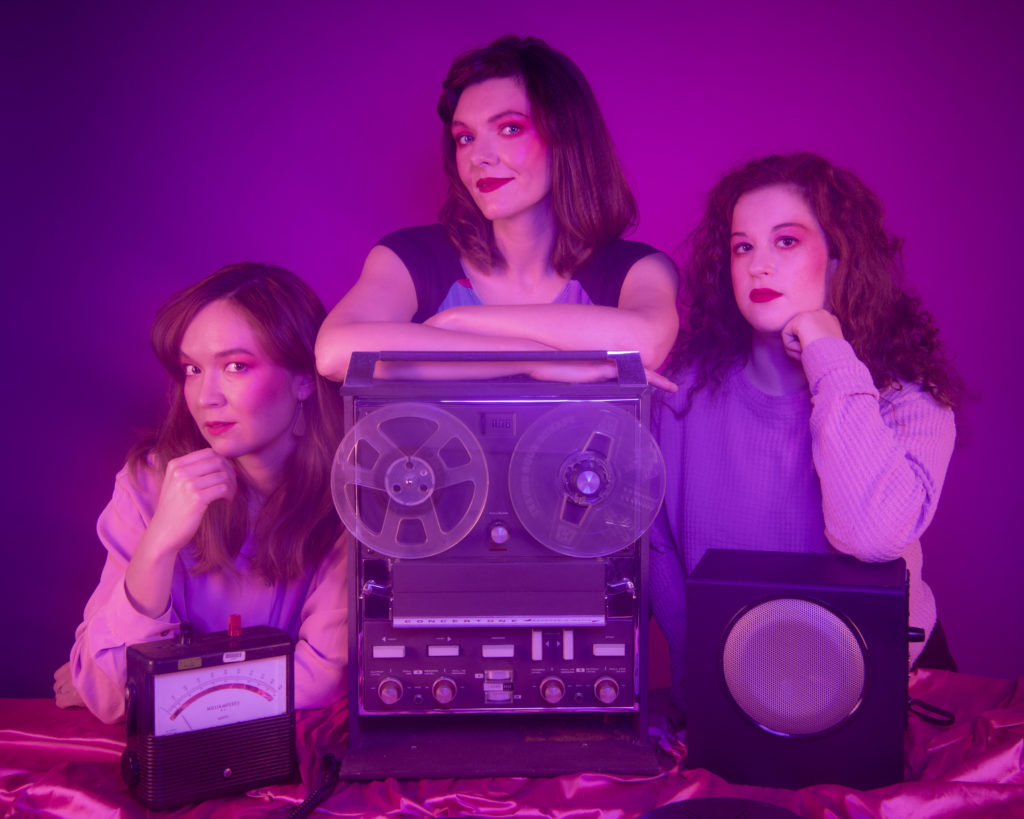In the over-saturated world of chat-casts, whose hosts hold dedicated discussions on everything from serial killers and skin care to a single 90s stoner band, sustaining interest and audience growth calls for a tricky sort of alchemy. These shows need a subject that’s appealing enough, but not too generic, a perspective that’s singularly compelling, and abundant lashings of chat-caster chemistry to tie it all together. It’s hard enough to get this right once, but the women behind the Night Call podcast have managed to do it twice.
Pop culture journalists Emily Yoshida, Tess Lynch, and Molly Lambert founded Girls in Hoodies a play on the TV show about soccer,Men in Blazers—in 2014, while working together at Grantland, ESPN’s popular sports and culture blog. Two of the three, Lynch and Lambert, had been friends since middle school. When they met Yoshida, Lynch says, “We formed a podcast and a lifelong bond.”
On the show, they talked about things that cemented their bond, from fanfiction to zany conspiracy theories to pop culture nostalgia, well, Frasier nostalgia specifically. “We recorded every Wednesday at LA Live,” recalls Lynch. “It was the highlight of my work week!” The show quickly gained a passionate following. However, the shuttering of Grantland in 2015 brought it to a halt.
“We know there are a lot of shows, but the dystopian call-in show field is not as crowded as some,” says Lambert.
Two years later, in 2017, Yoshida asked Lynch and Lambert if they’d be interested in regrouping, and they began figuring out what to keep from Girls in Hoodies and how to evolve. The chemistry was still there, but what would they now discuss? And would their audience find them again?
The first challenge was easy enough to resolve. What brought them together, thematically, remained the same. The trio had a common background in writing about culture. They settled on a new format—a late-night call-in and request show—in part due to expedience, since they now lived on opposite coasts, and in part as an homage to Art Bell’s radio show Coast to Coast AM. “Aside from that,” Lambert adds. “We’re all big fans of legendary West Coast oldies request show host Art Laboe. We also love public access television!”
To set up their new show, they listened to other podcasts for inspiration., They liked the science interview podcast Ologies for its curiosity, for having a point of view, and for being “very welcoming.” They appreciated the sharp critique and context in Citations Needed, a podcast about the intersection of PR, media, and power. And they also noticed what they liked about other conversational podcasts, such as Doughboys, in which two comedian friends (often argumentatively) review fast food chain restaurants, and Two Wise Jawns, in which two friends originally from Philadelphia discuss pop culture, politics, and their #ProblematicFavs. “My favorite stuff is always conversational and not overly fussy,” says Lambert. “We are always a work in progress but our producer Joelle Monique has really helped steer the show into its idealized final form.”

Nostalgia, pop-culture, and a dash of doom
On top of the nostalgia-soaked format and the chatty, inviting register, the trio were drawn to the same sorts of things, high and low pop culture, as well as topics in a more doom-y register, like Y2K and the death cult Aum Shinryuku. This quirky, eclectic ethos, defined by one enraptured listener as “spooky joy,” sets them apart even in a crowded field. “We know there are a lot of shows, but the dystopian call-in show field is not as crowded as some,” says Lambert. Lynch adds, “Even though it can be hard to describe our concept—conspiracy theories! Aliens! Bugs, planets, and reality shows!”—we’re very lucky that our listeners inherently get it, so we can just instinctively follow topics that fall under our strange little umbrella.”
Then, there was the tricky issue of actually letting people know that their strange little umbrella was open for business again. “Every podcast right now is dealing with a market that’s oversaturated with content,” Lynch says. “But we’re slowly, steadily building off the [audience] base we developed at Grantland.” Given that it was a sports podcast network, Lambert says their initial following consisted of “a sort of bro audience, which wasn’t necessarily what we expected.”
The listeners calling 240-46-NIGHT and mailing in range from middle-aged men in the United Kingdom to software engineers and theme park workers across the United States.
Over three years and 115 episodes, they’ve expanded their audience from their starter kit of “sensitive, open-minded bros” to people around America and beyond. The listeners calling 240-46-NIGHT and mailing in range from middle-aged men in the United Kingdom to software engineers and theme park workers across the United States. “We have found that there’s really no one type of listener we attract,” says Lambert. “There’s no one gender or age demographic, we have listeners of all types who are just interested in what we are.”
A little cross-over help from friends
Night Call’s audience-growth strategies are largely organic. “We are for sure trying to further grow our audience,” says Lambert, “but we think of it as a process like growing a plant—it takes patience.” One small thing that helps is getting the word about Night Call out on other popular shows. Yoshida, a film critic, is a frequent guest on the Blank Check, in which The Atlantic’s critic David Sims and the actor Griffin Newman discuss film directors whose success gives them a figurative blank check, which they then sometimes proceed to deploy in dubious ways. (Yoshida nicknamed their passionate fans Blankies, for which they in turn nicknamed her ‘the Mother of Blankies.’)
One particularly effective audience-building strategy Night Call has struck upon is featuring guests with similar podcasts or whose work explores similar pop-culture ground. For instance, recent episodes feature Jane Marie of The Dream, a documentary podcast whose most recent season explores scams in the wellness industry, Karina Longworth of the film history podcast You Must Remember This, and the New Yorker’s Jia Tolentino discussing the scary, riveting phenomenon of she’s called Instagram Face, in which people get plastic surgery to actualize what they look like when they use the flattering Instagram filter FaceTune. In the “spooky joy” vein, authors who’ve written about cults, such as Tom O’Neill, who wrote a book about Charles Manson “and the secret history of the 60s,” are a recurring feature. And Night Call continues the Girls With Hoodies’ fondness for nostalgia, featuring guests such as Rachel True, the self-described “Manic Pixie Black girl of the 90s” from the cult horror film The Craft.
Night Call also favors what Lynch calls “organic” mentions, “either when a host is referring to a guest spot, such as, ‘Oh, I was just talking about this recently when I went on Behind the Bastards’, or when there’s topic overlap, like ‘this seems very Who Weekly..” These guest appearances and organic mentions aren’t tracked, and the recipients of these name-checks aren’t expected to name-check them in turn. But they help establish the lively “podcast neighborhood” they’re in—to borrow from Pacific Content’s head of audience development, Dan Misener.
Cross-promos are another audience-growth gift that keeps giving. “We love teaming up with other podcasts whose vibes we share,” Lambert says. “It’s fun to belong to a network like iHeartRadio where there are a bunch of podcasts like Daily Zeitgeist, Ethnically Ambiguous, and The Bechdel Cast whose sensibilities line up with ours.” Recent promo swaps featured their “station sisters,” the comedians Caitlin Durante and Jamie Loftus, who discuss the representation of women in film in The Bechdel Cast, and Hollywood speech coach Samara Bay’s Permission to Speak.
Lambert says they soon plan to try out some “non-traditional promotion strategies,” such as doing a mukbang—an interactive livestream in which they’ll consume large quantities of food on camera—to commemorate reaching their next Patreon subscription goal. “We find that our loyal listeners will follow us anywhere,” she adds, “and we hope more people will join our mystic caravan.”
In our post-pandemic era of shrinking to non-existent social calendars, the Night Call caravan cannot be more appealing. The podcast conjures up the pleasant feeling of funny, charismatic guests chattering at a house party, which provides a blessed relief from solitary days of doom-scrolling. This lure recently landed them on “best podcasts” lists in Oprah Magazine and Elle.com. They plan to lean into this quality as much as they can in the near future, with many more virtual live events and Twitch streams.




Comments